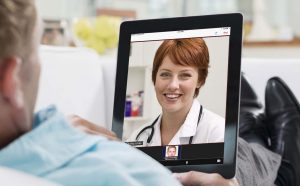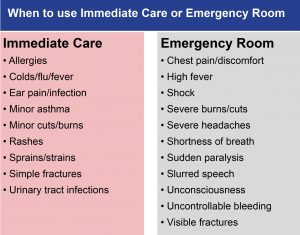
You’ve probably seen or heard the news that state health officials have said this flu season has already reached “epidemic levels.” Media outlets have reported that emergency departments throughout Washington are seeing high volumes this winter.
Here is Southwest Washington, Providence would like to remind the community about other care alternatives. Two, new Immediate Care clinics recently opened in Southwest Washington: West Olympia Immediate Care and Lacey Immediate Care. In addition, patients can utilize Express Care Virtual.
Immediate Care clinics (also known as urgent care) can help with non-life threatening medical issues for infants, children and adults that could become worse if not treated immediately. It’s a good option if your primary care provider is not available. The Immediate Care Clinic can take patients on a walk-in basis – no appointment scheduling is necessary.
The clinic offers care for a variety of issues, including:
- Illnesses
- Bone, joint or muscle complaints
- Cuts, puncture wounds, burns, foreign bodies, abscesses
- Work-related injuries such as back strain, minor bruises and minor cuts (new claims)
- Services such IV hydration, IV antibiotics and splinting
- X-rays and diagnostic imaging
- Lab tests for strep throat and flu
Providence Immediate Care Clinics in Southwest Washington include:

Lacey Immediate Care: 4800 College St. SE, 360-486-2900
Open Monday-Friday 8:00 a.m.-7:30 p.m.; weekends 9:00 a.m.-4:30 p.m.
West Olympia Immediate Care: 1620 Cooper Point Road SW (360-486-6710)
Open Monday-Friday 8:00 a.m.-8:00 p.m.; weekends 9:00 a.m.-5:00 p.m.
What is virtual care?
Providence Express Care Virtual is a telemedicine service that provides $39 online visits for minor illnesses right on your smartphone, tablet or computer. No appointment needed.
Express Care Virtual allows you to have a live, on-demand video visit with one of our doctors or nurse practitioners from your computer, smartphone or tablet. Virtual visits are an easy, convenient way to get a diagnosis and treatment recommendation, including a prescription, if needed. Wait times average less than five minutes.
This service is ideal for many common health conditions, including:

- Sinus, ear or eye infections
- Cough, cold and flu
- Rash and joint issues
- Prescription refills
Tips for avoiding the flu
The single best way to prevent seasonal flu is to get vaccinated each year, but good health habits like covering your cough and washing your hands often can help stop the spread of germs and prevent respiratory illnesses like the flu. Here are six tips from the CDC:
- Avoid close contact. Avoid close contact with people who are sick. When you are sick, keep your distance from others to protect them from getting sick too.
- Stay home when you are sick. If possible, stay home from work, school, and errands when you are sick. This will help prevent spreading your illness to others.
- Cover your mouth and nose. Cover your mouth and nose with a tissue when coughing or sneezing. It may prevent those around you from getting sick.
- Clean your hands. Washing your hands often will help protect you from germs. If soap and water are not available, use an alcohol-based hand rub.
- Avoid touching your eyes, nose or mouth. Germs are often spread when a person touches something that is contaminated with germs and then touches his or her eyes, nose, or mouth.
- Practice other good health habits. Clean and disinfect frequently touched surfaces at home, work or school, especially when someone is ill. Get plenty of sleep, be physically active, manage your stress, drink plenty of fluids, and eat nutritious food.
If you experience a life-threatening injury or illness at any time, call 911 immediately or visit the nearest hospital emergency room.





















































